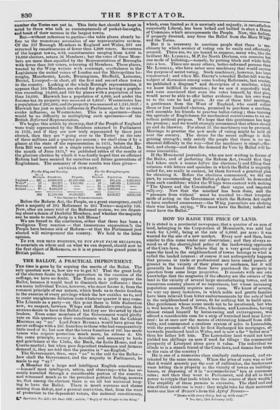THE BALLOT, A PRACTICAL IMPROVEMENT.
THE time is gone by for arguing the merits of the Ballot. The only question now is, how are we to get it? That the great body of the electors desire to obtain protection in the exercise of the suffrage, we have no doubt. The Tories as a party oppose the Ballot, because it would tend to diminish their influence : there are many individual Tories, however, who must favour it, from the common principle of our nature, which leads us to desire freedom in the exercise of every privilege which the law entitles us to, and to resist unrighteous dictation from whatever quarter it may come. The Liberals as a party—on this point there is little distinction now, we suspect, between Whigs and Radicals—proclaim their anxious desire to have the Ballot ; but they are thwarted by their leaders. Even some members of the Government would gladly vote on this question as their constituents wish; but the Cabinet Ministers say "no." Lord Jolla Russial. would have given the secret suffrage with a 20/. franchise to those who had comparatively little need of it; but now that the lower franchise of 10/. has made voters who require protection much more, he refuses it. On the same principle, secrecy is desirable and necessary to lords and gentlemen at the Clubs, the Bank, the India House, and on Courts-martial ; but when poor dependent tradesmen and farmers demand it, they are told that the practice is " un-English." The Government, then, says " no" to the call for the Ballot— how shall the Government, and the majority in Parliament, be made to say " ay ?" A Member for a large and intelligent English constituency —himself most intelligent, active, and observing—who has re- cently travelled through a considerable portion of the country, and witnessed much as to the prevalent political feeling, assures us, that among the electors there is an all but universal long- ing to have the Ballot. There is much soreness and shame arising from defeat, and a general conviction, that, from the want of protection to the dependent voters, the national constituency,
gie Spectator, No. 133; 4th Jaue 1831; attiele, " Reply of the People to the King."
which, even limited as it is unwisely and unjustly, is nevertheless essentially Liberal, has been bribed and bullied to elect a House of Commons which misrepresents the People. Now, this feeling, if properly directed, may force the Ballot from the Mere Whigs and the Tories.
But it is necessary to convince people that there is' ma- chinery by which. secrecy of voting can be easily and effectually secured. There are, we are bound to suppose, many who, like the brilliant Mr. LIDDELL, M.P. for North Durham, can conceive but one mode of balloting,—namely, by putting black and white balls into a box. There are many others, better-informed persons than Mr. LIDDELL, who have never seen machinery that would answer the purpose of secret voting. Such machinery, however, has been constructed : and when Mr. GROTE'S intended Ballot-bill was the subject of discussion among some leading Reformers, last session, we published a diagram* and description of a machine, which we know fulfilled its intention ; for we saw it repeatedly tried, and were convinced that even the voter himself, by that plan, would never be able to offer better evidence than his own word as to the vote he had given. At one of these trial meetings, a gentleman from the West of England, who could collect three or four hundred electors, promised to purchase a machine, and assemble his friends to practise ballot-voting ; thus training the aptitude of Englishmen for mechanical contrivances to an ex- cellent political purpose. We hope that this gentleman has kept his promise; and we would strongly recommend that others should go and do likewise. For about 51. the machinery can be procured. Meetings to practise the new mode of voting might be held all over the country. The desire for the secret suffrage is daily gaining strength; only satisfy the people that there is no me- chanical difficulty in the way—that the machinery is simple,effec- tual, and cheap—and then the demand for Vote by Ballot will be- come irresistible.
If the Ministerial journalists, who are now writing in favour of the Ballot, and of perfecting the Reform Act, (would that they had taken such a course before the elections !) and filling their columns with letters and speeches in which the Ballot is urgently called for, are really in earnest, let them forward a practical plan for obtaining it. Before the elections commenced, we did our part, by recommending that Ballot-pledges should be demanded from each candidate; whilst the Whigs were content with making "The Queen and the Constitution" their vague and impotent rally-cry. Now ihat the mischief has been done, and the " pressure from without" must be resorted to—that irregular mode of acting on the Government which the Reform Act ought to have rendered unnecessary—the Whig journalists are shaking their wise heads, saying, "We must have the Ballot; indeed we must have the Ballot."


























 Previous page
Previous page